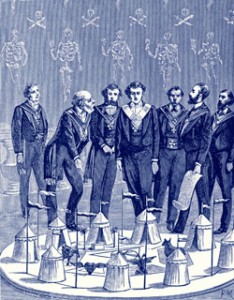Richard E. James, EdD, PhD, 32°
The study of Masonic philosophy through our ritual is a comprehensive quest for a better understanding of God, the nature of our world, human existence, and the relationship between those things. As such, the objective of our rituals is to reinforce ancient wisdom that centers around the fatherhood of God, the brotherhood of man, and the search for truth. Our fraternity has for centuries provided Freemasons with a set of values, morals, and ethics contributing to a unique mindset that has shaped our world view and brought about significant changes in the world we live in. There are several reasons why memorization and performance of our rituals are important but we will focus on three.
1. Provides opportunities for growth and self-actualization. Our rituals were not developed merely to elaborate on ancient legends but rather to teach our philosophy and to transform the character of those practicing them. While the ritual communicates spiritual principles and ideals consistent with the major religions, it also requires our members to go beyond mere philosophical response to active integration of those principles before they can have an impact on one’s life. Thus, the rituals worth does not just rest on reading and understanding the written word; it must move from the head to the heart to accomplish the purpose for which it was truly intended.
2. Reinforces our beliefs and the value of our institution. Our ritual provides a balance for the Freemason and gives insight into the challenges, setbacks, and trials that every man must face as a byproduct of the human condition. The answers provided from study typically draw from the spiritual teachings of past religious leaders and philosophers. The integration of the concepts teach one to think analytically and, it is hoped, to better understand the relation of the creature to his creator. “As every part of the circumference of a circle is equally near and equally distant from the center so is every creature God hath made equally near and equally distant from him.”
3. Provides understanding of the impact of our philosophy. The ritual tries to provide us an understanding of the person, character, mind, and will of the Supreme Architect of the Universe. Through self examination we can cut below the facade of appearances and provide ourselves insight into some of man’s inner motivations and plans through its study. As we read, memorize, and understand, it becomes a mirror that exhibits our true character, exposes areas of self-delusion, and exhorts us to change. A working knowledge of our degrees, teachings, and the basic tenets of our fraternity provide us wisdom and guidance in the decisions that shape the course of our very existence and a philosophical perspective that will enable us to respond in a correct manner to our circumstances and rise above them.
Our ritual was always intended to teach our philosophy. It is best understood as a worthwhile endeavor designed to shake us free from the world’s force-fed assumptions and preconceived ideas and to teach us to think analytically and independently. For those who become truly involved with ritual, its memorization and practice is more than a mere hobby or pastime, it enters into every aspect of one’s life. Socrates said, “The unexamined life is not worth living.” To some, that might sound really arrogant. But please remember that in making that claim he was speaking as a philosopher, expressing a discovery that each person makes for himself once they have begun seriously to embrace the study of any philosophy. If life seems more problematic for the philosopher, then life without philosophy becomes simply unthinkable.
All men by nature desire to know…. It is owing to their wonder that men both now begin and at first began to philosophize.
—Aristotle







